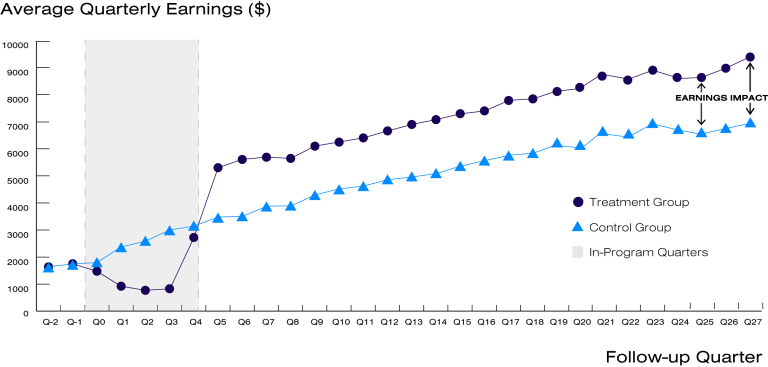
Year Up United's
Groundbreaking
Results
The data's clear: Our effective job training generates
significant, sustainable earnings impacts for young adults
and unprecedented benefits to society.
Latest research confirms that Year Up United’s earnings impacts continue to be the largest reported to date for workforce programs tested by gold-standard RCTs.
Partnering with the Office of Planning, Research & Evaluation (OPRE) and Abt Associates, Year Up United is one of nine leading programs selected to take part in the federally-sponsored Pathways for Advancing Careers and Education (PACE) Evaluation. This evaluation uses a randomized controlled trial (RCT), the rigorous “gold standard” of studies. This latest 2022 PACE report—the third publication in a series that compares workforce outcomes of treatment and control group members before, during, and after the Year Up United program—evaluates Year Up United outcomes six years after graduation.
30% WAGE GAIN AT SIX YEARS AFTER GRADUATION FOR YEAR UP UNITED PARTICIPANTS
$2.46 IN SOCIETAL BENEFITS FOR EVERY $1.00 INVESTED IN YEAR UP UNITED
The independent evaluation by Abt Associates found that average earnings gains of over $8,000 per year persisted to the end of the seven-year study period for Year Up United treatment members.
Year Up United’s cumulative earnings impacts over the seven-year study period were large and significant for all young adults and locations in the study.
While the ongoing pandemic had a disproportionate economic impact on young adults of color, earnings gains for the Year Up United group persisted during the economic downturn caused by COVID-19.
Latest report demonstrates Year Up United's significant, long-term impact on earnings gains.

Six years out, average earnings for Year Up United treatment group were 30% higher than the control group.
Further Reading
We invite you to enjoy the following:
- Scaling Up to Close the Opportunity Divide for Low-Income Youth (Fein, 2016) A Year Up United case study examining how we grew our program successfully and rapidly during the PACE evaluation.
- Learning Together: Building Stronger Practitioner-Researcher Partnerships (Fein, 2016) Insights on Year Up United and Abt's longstanding collaboration.
For more PACE reports, visit PACE website.
Acknowledgements
The Social Innovation Fund (SIF) was a program of the Corporation for National and Community Service (CNCS) that received funding from 2010 to 2016. Using public and private resources to find and grow community-based nonprofits with evidence of results, SIF intermediaries received funding to award subgrants that focus on overcoming challenges in economic opportunity, healthy futures, and youth development. CNCS supported the PACE evaluation through SIF grants to New Profit (2010-2015) and Venture Philanthropy Partners (2011-2016) and subgrants to Year Up United. We are grateful to our SIF partners for their support.
We also wish to acknowledge the Open Society Foundations who made significant contributions to help Year Up United expand participants recruitment for the study, and our partners at the Office of Planning, Research, and Evaluation (OPRE) of the Administration for Children and Families at the U.S. Department of Health and Human Services (HHS) for their sponsorship of the wider top-notch evaluations team at Abt Associates who conducted this rigorous study and provided Year Up United with technical assistance along the way.
Read the groundbreaking results:
In the Press
Year Up United is committed to ensuring equitable access to economic opportunity, education, and justice for all young adults—no matter their background, income, or zip code.
Make an impact and support our work today.
Learn more about Year Up United’s Research & Evaluation efforts here.













